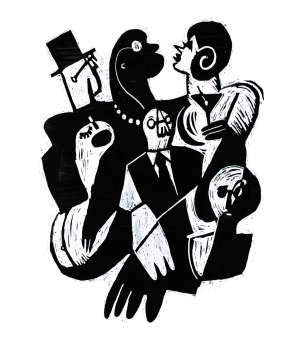
'It is communists who think like Christians': free ebooks on Marxism, religion and communism
Culture Matters has published three free ebooks containing essays by the theologian and writer Professor Roland Boer.
Our aim with the topic of religious and spiritual life is the same as our aim across the arts and all other cultural activities - to unearth and mobilise the radical meanings in religious thought, teaching and practice. We believe the intersection of religion and progressive politics is a field which merits serious study, as the intellectual bankruptcy of neoliberalism becomes increasingly obvious to people, reactionary politicians continue to hide behind a socially conservative interpretation of religion, and as recognition of the need for wide-reaching and progressive change in Britain grows.
Organised religion repels a lot of people these days, because of the perception that it is elitist, dogmatic and socially exclusive. But there is a radical strand in the modern Christian, Jewish, Muslim and other faiths, based on helping the poor, promotion of the common good, respecting the dignity of labour, and practising solidarity with the socially excluded. This radical strand includes political campaigning against the structural causes of poverty and inequality in the name of social justice, as well as encouraging individual acts of charity.
To take a few examples, all of the main Christian groups - Anglicans, Methodists, Catholics, United Reformed Church, Baptists, Quakers, Church of Scotland - are supporters of Real Living Wage campaigns, which aim to improve the situation of workers in low-paid, precarious employment. Churches of a variety of denominations have come together to help the victims of recent tragedies such as the Grenfell Tower fire and the Manchester Arena bombing. And consider also the critical statements made by Pope Francis about capitalism such as, 'We cannot wait any longer to deal with the structural causes of poverty, in order to heal our society from an illness that can only lead to new crises.' The pope has repeatedly cited the pitfalls of capitalism, decrying global income inequality and equating low-wage labor to a form of slavery. He has even said, in that bitterly ironic tone characteristic of Jesus' voice in the Gospels: 'It is the communists who think like Christians'.
Combining a progressive political strand with a radical application of religion could make a useful contribution to the national conversation about the direction of a future Labour Government. It also could empower people to reclaim their spiritual and moral heritage, and help inspire, motivate and underpin local campaigning activity. Just like art, religion can be a tool of oppression, a means of legitimating unfair distributions of power and wealth – but it can also be a powerful tool for the radical liberation of humanity.
In the first essay, Professor Boer discusses Marx's description of religion as 'the opium of the people'. He says:
Marx’s most well-known observation concerning religion is that it is ‘the opium of the people’. The meaning would seem to be clear: opium is a drug that dulls the senses and helps one forget the miseries of the present. So also with religion. The catch is that Marx’s use of ‘opium’ is not so straightforward, for it actually opens the door to what may be called a political ambivalence at the heart of religion.
Go to Religion: the opium of the people? for the first essay.
In the second essay, Professor Boer analyses the various relationships between religion and capitalism, especially Marx's use of the term 'fetish'. He says:
Marx was then able to distil the idea to locate the central fetishistic function of capitalism: money produces money, capital produces profit or interest in and of itself. Only a complex theory of fetishism can explain why ‘capital thus becomes a very mystic being’, especially ‘since all of labour’s social productive forces appear to be due to capital, rather than labour as such, and seem to issue from the womb of capital itself. In this sense can we say that capital becomes the ‘religion of everyday life’.
Go to Religion and capitalism for the second essay.
In the third essay, Professor Boer discusses the biblical basis for Christian communism; the views of Engels, Kautsky and Lenin; its history in Europe and Russia; modern examples of the mutually supportive ways in which Christianity and communism operate in North Korea and China; and suggests some possible lessons for Western churches and socialist parties. He says:
Churches, mosques, temples and meditation centres need to remember that religion is not all about a private spiritual life focused on another world. This world too, with its exploitation, injustice and inequality, is also vitally important. As each tradition recognises, faith is collective and unitive, a fundamental part of our social natures and of human cultures.
Go to Christianity and Communism for the third essay.
We hope these essays stimulate critical discussion, and would welcome critical and creative responses to the issues they raise. We invite people to share the ebooks via their networks, join us in the debate and contribute ideas about to how advance this agenda.
